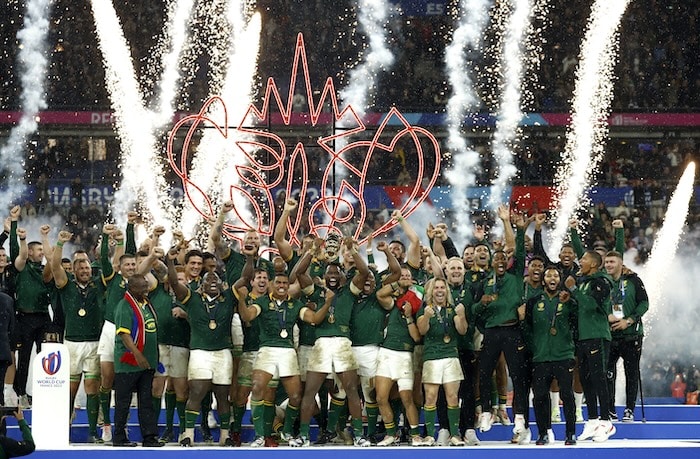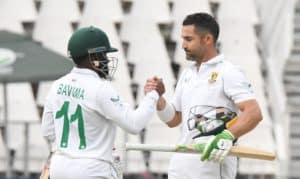South Africa clinched a record fourth Rugby World Cup title after defeating 14-man New Zealand to retain their crown in a thrilling final in Paris.
In the 27th minute, Sam Cane caught Jesse Kriel high. Handre Pollard’s dead-eyed goal kick had already given the Springboks a 9-3 lead, so they looked like they had the upper hand.
After a review, the New Zealand captain was given a red card. Another Pollard penalty put the All Blacks down a player, nine points behind, and in a lot of trouble.
But New Zealand came back, rode their luck, and got back into the game. Beauden Barrett picked up a loose ball and slid in after the break to cut South Africa’s lead to 12–11. Richie Mo’unga kicked a penalty before the break.
In an exciting and exhausting last quarter, both teams tried to score a decisive goal but failed. Jordie Barrett missed a long-range penalty in the 73rd minute, and the Springboks held on for their third straight one-point win in the knockout stages.
As captain Siya Kolisi danced off the bench and towards his teammates at the end of the game, he shook his head in shock. His team is the first to win the tournament back-to-back away from home. Coach Jacques Nienaber emphasised this point before the game. They are now without a doubt the best team in World Cup history.
With this win, the Springboks have now won half of the eight tournaments they have played in. South Africa didn’t go to the first two because the rest of the world put a sporting exile on the country because of its apartheid government.
Many black South Africans hated the Springboks back then. Kolisi, the team’s first black Test captain, has led them to victory, and people from all over the Rainbow Nation have backed them.
After four years, Ian Foster’s time as head coach of New Zealand came very close to winning the ultimate prize. He was under pressure in the lead-up when his team fell short of their usual high historical standards.
The two teams went at it right away, while the Stade de France was still filled with the sound of a full-throttle haka.
There were cheers and groans when Eben Etzebeth tackled Mo’unga. Then, Shannon Frizell’s desperate attempt to remove South Africa hooker Bongi Mbonami from a breakdown took both players out of the game, one temporarily and one permanently.
On review, Frizell only got a yellow card for an ugly neck roll clear-out, but Nbonambi, the Springboks’ only specialist hooker, had to leave the game because he was hurt.
After Nbonambi was taken off, Deon Fourie, who used to be a flanker, came on and his team made the most of having an extra player.
Pollard got two penalties during the power play. His accuracy off the tee helped him get a starting spot.
There was no drop in physicality. There was a fight at the breakdown. The line-out was like a luck game for limbs. Big hits smashed the gainline. In midfield, Jordie Barrett and Damian de Allende ran at each other with all their might.
Both Pollard and Mo’unga missed penalties, but the Springboks held on to their 9-3 lead.
Not following the rules cost New Zealand a lot when they lost to the Boks in a warm-up game at Twickenham in August, and they did it again.
Cane and Kriel crashed into each other while there was a lot of traffic. It wasn’t meant to hurt the South Africa centre, but the fact that he put his shoulder to the side of his head without trying to dip made it likely that he would get a red card on review.
The news came from referee Wayne Barnes as Pollard lined up another penalty, thanks to good work from Steven Kitshoff.
To make things worse for New Zealand, Pollard’s kick went in, and with 34 minutes played and the All Blacks 12-3 down, it looked like the game and the cup might already be over.
But the All Blacks were angry about what seemed to be their fate. It looked like they had a penalty advantage when Rieko Ioane was scuffed, but Mo’unga made a good kick soon after to send his team down the tunnel 12–6 down but still in touch.
Their defence was thin, though, because they had to support the scrum and watch out for South Africa’s fast wings at the same time.
I think Kolisi should have put Kriel in for a try in the first minute after the restart. Barrett dropped a high ball in his lap, and Kolisi sprinted towards the line. Kurt-Lee Arendse almost scored as he chased a game that seemed hopeless.
Kolisi, the Springboks’ captain, was the third player to be sent off for a high hit on Savea. New Zealand then tied the game briefly in terms of players, but quickly broke it open again.
Aaron Smith had already had a try taken away because of a knock-on when Jordie Barrett threw a huge pass to Mark Telea that went wide.
The wing turned, stepped and dropped the ball as he was being tackled close to the goal line. For the most part, it was thought to have gone backwards, and Beauden Barrett gathered himself and slid over.
South Africa was ahead by a point, 12–11, but Mo’unga’s conversion missed the mark. Twenty minutes were left.
New Zealand threw everything they had at the Boks, but their defence held strong.
When South Africa winger Cheslin Kolbe rushed in to tackle a running Anton Lienert-Brown, he knocked the ball out of the air, giving the All Blacks their best chance.
Kolbe got a yellow card for intentionally knocking on the ball, and Jordie Barrett called for the tee. But the All Black center’s kick, which came from a tricky angle just inside the Bok half, went wide. His team tried hard, but they couldn’t make the most of another time when they were down to 14 men for the rest of the game.
South Africa has had the hardest and narrowest path to the trophy. Their wins over France and England were also very close.
Photo by EPA/YOAN VALAT





